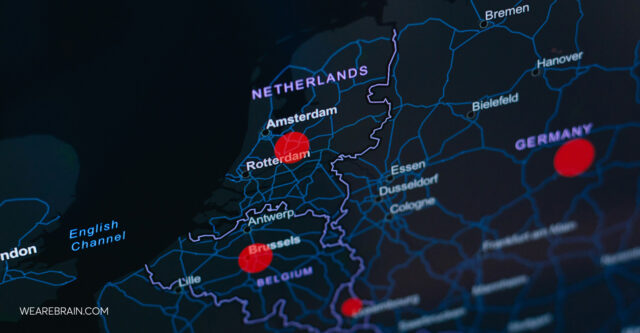
The pendulum of workplace expectations keeps swinging. After years of remote-first enthusiasm, 2025 has seen a wave of return-to-office mandates from major corporations worldwide. Yet here in the Netherlands, many organisations are charting a different course—one that values flexibility, employee autonomy, and results over rigid attendance policies.
This isn’t merely resistance to global trends. It’s a recognition that the Dutch approach to work—with its emphasis on efficiency, work-life balance, and pragmatism—naturally aligns with thoughtful hybrid and remote models.
The Netherlands leads Europe in workplace flexibility
The numbers tell a compelling story about where the Netherlands stands in the evolution of work:
Remote work adoption: As of 2023, over 5 million people in the Netherlands worked from home at least occasionally—representing 52% of the working population and securing the country’s position as the EU leader in remote work.
Hybrid model prevalence: By 2025, approximately 70% of Dutch companies have implemented hybrid arrangements, typically requiring 2-3 days in the office each week.
Legal protections: The Dutch “Flexible Working Act” provides formal support for these arrangements, allowing employees with at least six months of service to request changes to their work location.
Tangible benefits: The shift has eliminated commutes for many workers, saving an average of 10 hours weekly—equivalent to 48 extra vacation days annually.
How do we compare to European neighbours?
The Netherlands’ approach stands out even within Europe:
Hybrid adoption gap: Across the EU, hybrid work arrangements cover 44% of remote-capable roles—significantly lower than the Netherlands’ 70%.
Declining remote work: Fully remote positions across the EU have dropped from 24% in 2022 to 14% in 2024, reflecting a return-to-office trend that the Netherlands is largely resisting.
Regional disparities: While Ireland, Finland, and Germany join the Netherlands with over 70% of employees enjoying flexible options, southern European nations like Cyprus, Greece, and Italy remain predominantly office-based.
Employee preferences: Despite declining remote job postings, 74% of EU workers prefer to work remotely at least occasionally—revealing a disconnect between corporate policies and workforce desires.
Why the Netherlands remains fertile ground for flexible work
This statistical leadership isn’t coincidental but built on structural and cultural foundations. The Netherlands offers exceptional digital infrastructure—99.8% broadband penetration and some of the world’s fastest internet speeds—creating a technical backbone that makes remote work viable everywhere.
Despite the country’s compact size, Dutch workers have historically faced some of Europe’s longest commute times relative to distance. The Dutch efficiency mindset plays a crucial role as well, with a cultural emphasis on productivity over presence rather than hours logged in an office.
The Flexible Working Act established the right to request flexible arrangements long before remote work became mainstream, creating a legal foundation where flexible work isn’t merely tolerated but actively embraced as a sensible business approach.
The corporate context: Balancing global trends with local benefits
As multinationals issue sweeping return-to-office policies, Dutch companies are finding ways to preserve flexibility while addressing legitimate concerns about collaboration and culture.
Progressive Dutch employers are redesigning physical workspaces for activities that genuinely benefit from co-location—workshops, strategic planning, and team building—while allowing focused work to happen remotely. Companies like Mollie and Adyen have pioneered communication approaches that reduce meeting fatigue, documenting decisions and encouraging thoughtful responses over immediate reactions.
The data supports this nuanced strategy. Companies maintaining flexible policies report 27% higher retention rates and access to talent pools 3.5 times larger than office-only counterparts—significant advantages for a compact country with near-full employment.
How can we maintain “gezelligheid” without daily face time?
Perhaps the greatest challenge for Dutch remote teams is preserving the cultural value of gezelligheid—that untranslatable sense of coziness and belonging traditionally fostered through in-person interaction. The statistics showing 32% of full-time remote workers reporting loneliness highlight this challenge.
Successful organisations address this through deliberate community building, technology configured to encourage informal interaction, and structured processes to integrate remote employees into company culture. These approaches acknowledge that connection requires intention in distributed environments but can flourish with the right support.
Where are we seeing innovation?
Dutch organisations are pioneering approaches that balance flexibility with accountability. Companies like Viisi have implemented results-only work environments, eliminating time-tracking entirely and focusing exclusively on outcomes while giving employees complete autonomy over when and where they work.
Technological innovation is driving new hybrid meeting experiences, with advanced setups creating equitable experiences for in-person and remote participants. We’re also seeing experimentation with four-day workweeks and neighbourhood work hubs—networks of small, local workspaces that offer professional environments closer to residential areas.
The Dutch approach to the future of work
While global corporations may be retreating to traditional office models, many Dutch organisations are taking a more nuanced view. This approach reflects broader cultural values: pragmatism over dogma, quality of life alongside productivity, and thoughtful innovation rather than trend-following.
For organisations navigating these decisions, the key questions aren’t whether to be remote or in-office, but: Which activities truly benefit from co-location? How can we design both physical and digital environments to support our work? What structures ensure connection, equity, and performance across locations?
Finding your path forward
As hybrid and remote models continue to evolve, Dutch organisations have an opportunity to lead by example, demonstrating how flexibility and performance can reinforce rather than undermine each other.
The Netherlands stands at a crucial inflection point. While the EU has seen fully remote positions decline from 24% to 14%, our commitment to flexible work arrangements positions Dutch companies to retain the competitive advantages of broader talent pools and higher employee satisfaction.
The future of work in the Netherlands won’t be defined by global mandates but by our own pragmatic pursuit of arrangements that support both business success and quality of life. By focusing on outcomes, intentionality, and human connection, Dutch organisations can continue pioneering work models that deliver competitive advantage.
